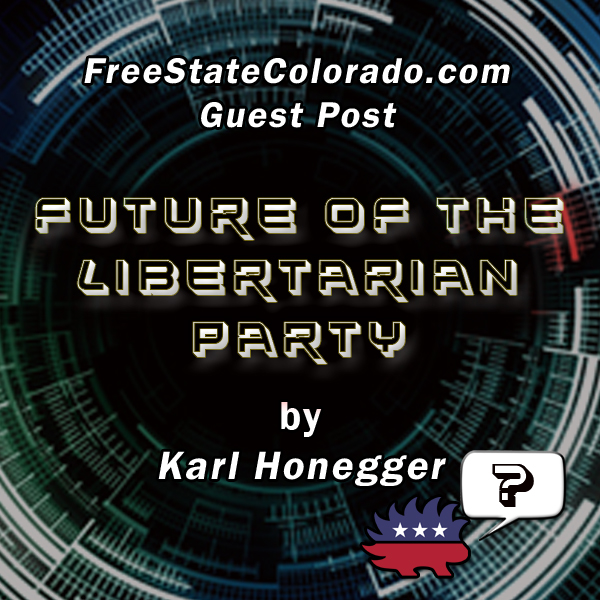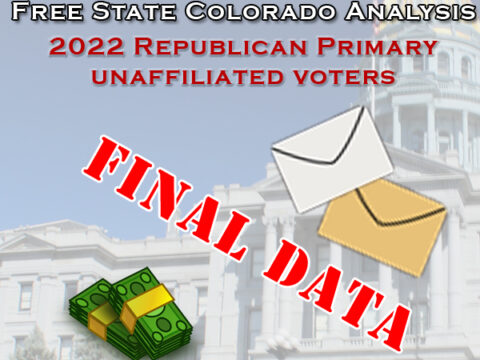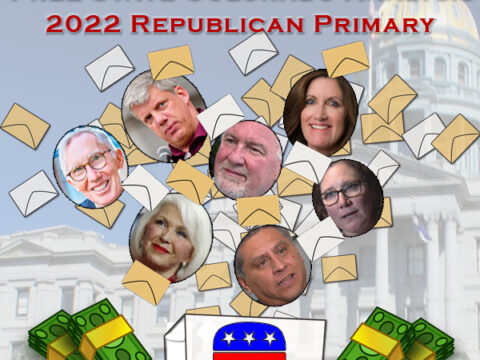Over $100 Million is being spent to change how American States operate their elections.
In this guest post, Karl Honegger presents an in-depth look at the efforts of Big Tech Billionaires to change how Americans vote.
Karl’s work has previously appeared on Free State Colorado with The Blueprint 2.0 (co-written with Sarah Harrison), nearly a year ago.
Read Karl’s article and let us know what you think with a comment at the end.
The Mises Caucus of the Libertarian Party recently took over many of the leadership positions. While this may seem like a long term move towards spreading the message of liberty, it needs to be understood in context of what political power might look like at the end of this decade.
In June 2020, a book called “The Politics Industry” was published and co-authored by businesswoman Katherine Gehl and Michael E Porter from the Harvard Business School. They start their discussion about politics by mentioning the Military-Industrial (Congressional) Complex speech by Eisenhower that many libertarians are aware of. Instead of addressing this as something to fight against they argue that there is a Political Industrial Complex and they want to offer solutions to fix this. They re-invent the wheel in terms of explaining the problems with Washington D.C. but it is their solutions that they provide the most meat.
They completely ignore other reforms such as Approval Voting or expanding the House.
They mostly settle on what is called Final Five Voting to reform the makeup of Congress.
They believe that using Ranked Choice Voting in the general election with five candidates per seat would be best only if combined with a Jungle Primary.
They try to use the term Open Primary, but in Colorado, we have an Open Primary which is very different, and so to not confuse the two I will use the more derogatory term Jungle Primary. The primary that they want is one where you only get to vote for one person on the ballot and the same ballot is sent to every single voter.
The Jungle Primary is unique because it doesn’t allow for a private organization such as a political party to limit the number of candidates that claim to be a member of their party. Because there is no party assembly process there is no vetting of candidates by party members before their names on printed on the ballots.
While this is an extremely nerdy and idealistic view of electoral change, it is the strategy they suggest that makes this relevant to members of the Libertarian Party. Idealistic political nerds need an effective, and well-funded strategy. Gehl and Porter have provided that framework.
They first suggest what is called a “Noah’s Ark” strategy invented by DaVita CEO Kent Thiry and most recently (and successfully) implemented in 2020 in Colorado.
Colorado taxpayers had saved $35 Billion dollars in property taxes since a constitutional amendment named after Democrat Dennis Gallagher passed in 1982. It basically forced the state government to lower the assessment rate on residential properties after a sharp rise in home values. This kept property taxes low while school districts and local governments screamed that they should be able to cash in on the increase in property values.
For years politicians had wanted to get rid of the amendment but didn’t know how.
Kent Thiry then used his “Noah’s Ark” strategy to make it seem like Republicans and Democrats agreed it was best to scrap the amendment. He asked as many big-name Republicans as he needed to endorse the plan to scrap the taxpayer protections without a replacement. He could easily get Democrats to get on board the boat, and made sure that he never made it seem like more Democrats supported his effort than Republicans. So, the way he had the website and messaging setup ensured that it never looked like he had more Democrats endorsing the idea than Republicans.
This two-by-two strategy worked.
The next part to their strategy is that they suggest that $100 million dollars is raised and spent over a period of 10 years to get their Final Five reform passed in states that allow for ballot initiatives and propositions to be placed on the ballot through collecting signatures. They know that citizens upset with Congress will easily sign a petition that seems to address their frustration. The progressive movement of the early 1900’s led to a lot of states adopting this petition process to place a referendum on the ballot so there are about 26 states that they would target to spend this money.
But to fundraise requires knowing the right people, and having an infrastructure in place with political operatives with experience.
This is where Unite America comes in.
In 2017, the Murdoch family sold Fox 21 to Disney. James and his wife Kathryn Murdoch took $100 million and placed it into a nonprofit they called Quadrivium. Kathryn distributes funds from this towards advocating for government central planning to “fight climate change” and to attack the Trump wing of the Republican party.
But she also has used it to fund Unite America which is a “Democracy Reform group” that has been active in trying to reform Congress.
Kathryn Murdoch has publicly stated that she is working to raise money for Final Five electoral reform. She has already been able to get billionaires Reid Hoffman and John Sobrato on board along with Lyft former chief strategy officer Rajil Kapoor.
Ranked Choice Voting advocates in Colorado were offered $1.5 million to promote a Final Five ballot question for the 2022 election. They turned it down because the people holding the strings to the dark money would not allow any alternative to the Final Five. The reason is because a Jungle Primary prevents third party candidates from getting a chance on the general election ballot.
Therefore, the Libertarian Party will become basically pointless as the wealthy elites in the United States will prevent their candidates from getting onto the ballot. This isn’t some theory; I have the data to show it.
Let’s look at the most recent jungle primary run in Alaska where never-Trumper Lisa Murkowski was able to get onto the ballot for U.S. Senate. Because she ran in a non-partisan primary the other three candidates who made it on the general election ballot are: Trump endorsed candidate Kelly Tshibaka, Democrat Patricia Chesbro and fourth place Republican Buzz Kelley.
This Final Four Voting reform ensured that the Libertarian Party candidate Sean Thorne did not make the general ballot along with Alaskan Independence Party candidate Joe Stephens. While Republican Buzz Kelley spent $0 on his campaign, the Libertarian Party spent $4K on their candidate.
To put this in context, Libertarian U.S. Senate Candidate Joe Miller came in 2nd place in 2016 as he received 29% of the vote. The Independent candidate Margaret Stock came in 3rd place with 13% of the vote. However, these parties had no representation in 2022 for U.S. Senate.
The November election will make it so Anti-Trump groups will be able to setup Astro-turf organizations convincing voters how to use RCV in the November election. This will ensure that Democrats who don’t like Trump can still have their votes go to Lisa Murkowski because Patricia Chesbro won’t win. Only 14% of Alaskan’s are registered Democrat but their votes going to Lisa Murkowski is why RCV is the perfect solution for the elites. Either way, the Trump endorsed candidate can’t win.
For Governor, you have Trump endorsed Mike Dunleavy as opposed to the “independent” candidate Bill Walker. Walker received a $100K donation from Kathryn Murdoch. Murdoch’s money will go further now with the voting reform she helped pay for because the Democrats will be able to rank Walker as their second choice candidate so that their votes will go to him after their candidate loses.
This system benefits the wealthy elites that are connected either to Washington D.C. or Silicon Valley.
Therefore about $100 million is being raised from Silicon Valley leftists who want a system that enables them to exert control over elections in even Red States where normally only the Trump endorsed Republican would make it past the primary.
Even if Libertarian think tanks like CATO see promise in the Final Four/Final Five voting system these elites don’t care at all about the Libertarian Party.
Every single Alaskan Primary voter was able to see a Libertarian candidate on their primary ballot and yet the system ensured that the Libertarian party Senate candidate’s campaign was stillborn. This is in a state where 55% of voters are not registered with a party.
Alaska is the first out of the 26 states that allow voters to change their election systems through referendum that has been able to neutralize their state Libertarian party. Alaska was also just a test case so they could then convince voters in other states by arguing that if Alaska voters embraced this voting reform, why don’t we in _ (insert state) _?
Dark money groups in Alaska spent $40 per yes vote in 2020 to win by 0.55% to get the voting reform passed. Kathryn Murdoch and the wealthy elites working with her have already been able to move beyond their first state of Alaska.
Astro-turf organizations in Nevada have been able to harness millions of dollars from out-of-state dark money groups to get a Final Five Voting initiative onto the ballot for November 2022. Voters already support the idea by a 15-point margin (42 to 27 percent). While this ballot question, if passed in November would need to be approved again by voters in 2024, it shows how the elites are working their plan.
They’ve laid out the theory, paid for the white papers and began the fundraising. No joke, there is a paper that says that if you support minority groups then you must support Ranked Choice Voting.
They will use this to guilt Democrat voters into adopting this reform.
They are playing a long game and have already built the ground game for Final Four in Missouri and then will attempt to get this idea passed in Colorado when they can get around the grassroots RCV organizations.
With $100 million from Silicon Valley being spent over the next decade they will be able to implement their reforms in enough states that the Libertarian Party won’t be able to get statewide candidates onto the general ballot in most states.
No candidates, very little voice.
The idea of the Libertarian Party was created in August 1971 in Colorado. The Final Five Voting reforms that will begin to become law over the next decade will make the party become more irrelevant than ever.
The Mises Caucus is trying to reform the Libertarian Party but the Silicon Valley plan to reform our voting systems will crush the Libertarian Party.
If liberty activists want to invest their time in trying to make political change at the local level, it might be best to get involved in their local Republican party.
Let’s get Liberty right.
Karl Honegger is a certified treasury professional and a member of the Emerging Leaders Council Advisory Board with the Steamboat Institute. He has eight years’ experience in the petroleum industry working for oil and natural gas companies and now works in healthcare. He helps produce the Colorado Liberty Scorecard, the most comprehensive legislative scorecard in the state of Colorado.
What do you think about Karl’s article?
Leave a Comment Below!
Get the Free State Colorado Email Newsletter:
Follow on Telegram: t.me/FreeStateColorado




Recent Comments